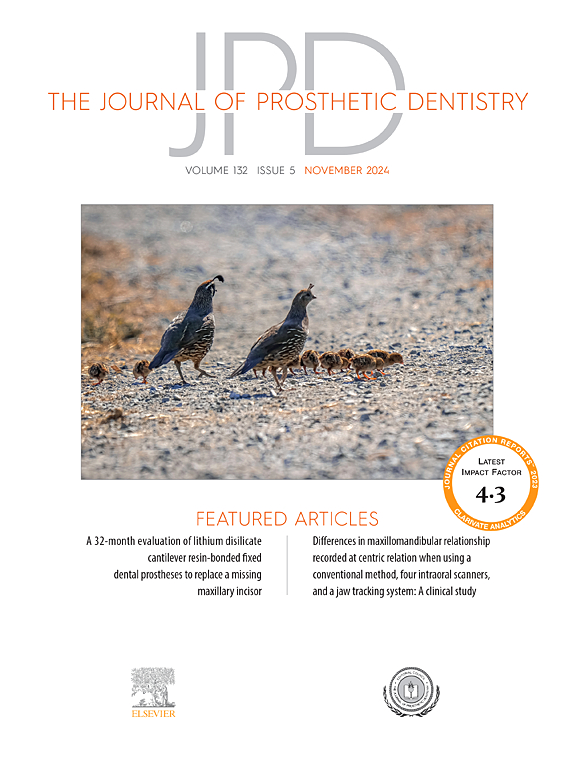使用三维成像和制造双侧耳廓假体:六名先天性耳廓缺损患者的病例系列。
IF 4.3
2区 医学
Q1 DENTISTRY, ORAL SURGERY & MEDICINE
引用次数: 0
摘要
单侧耳朵畸形的修复重建是一种简单易行的手术,它需要复制对侧耳朵的细节、位置和对称性。然而,重建双侧缺失的耳朵却极具挑战性。本文介绍了三维(3D)技术在 6 名患者双侧缺失耳朵修复重建中的应用。畸形部位是通过对患者的数字扫描直接分割或通过台式扫描仪间接创建的。此外,还通过虚拟方式确定了植入物固定所需的足够骨量和骨质以及最佳植入位置。三维技术的使用使耳朵的对称性更容易实现,并能以最小的主观因素可靠地验证耳朵的方向和位置。打印出来的耳朵在形状、表面纹理和解剖结构上都是匹配的。皮肤颜色可以直接记录和存储,以便将来复制。总之,耳朵的数字化制造是可控的、一致的和可复制的。本文章由计算机程序翻译,如有差异,请以英文原文为准。
Use of 3-dimensional imaging and manufacturing for bilateral auricular prostheses: A case series of six patients with congenital auricular defects
The prosthetic reconstruction of unilateral ear deformity is a straightforward procedure which relies on copying the details, position, and symmetry of the existing contralateral ear. However, reconstructing bilaterally missing ears is challenging. The use of 3-dimensional (3D) technology in the prosthetic reconstruction of the bilaterally missing ears of 6 patients is described. The deformity site was created directly by segmenting the patient’s digital scan or indirectly via a desktop scanner. Adequate bone quantity and quality for implant retention and optimal implant locations were also identified virtually. The use of 3D technologies has made it more straightforward to accomplish ear symmetry, as well as to validate the orientation and location of the ears reliably with the minimum subjectivity. The printed ears were matched in shape, surface texture, and anatomy. The skin color was straightforward to record and store so that it could be reproduced at a future time. Overall, the digital manufacture of the ears was controlled, consistent, and reproducible.
求助全文
通过发布文献求助,成功后即可免费获取论文全文。
去求助
来源期刊

Journal of Prosthetic Dentistry
医学-牙科与口腔外科
CiteScore
7.00
自引率
13.00%
发文量
599
审稿时长
69 days
期刊介绍:
The Journal of Prosthetic Dentistry is the leading professional journal devoted exclusively to prosthetic and restorative dentistry. The Journal is the official publication for 24 leading U.S. international prosthodontic organizations. The monthly publication features timely, original peer-reviewed articles on the newest techniques, dental materials, and research findings. The Journal serves prosthodontists and dentists in advanced practice, and features color photos that illustrate many step-by-step procedures. The Journal of Prosthetic Dentistry is included in Index Medicus and CINAHL.
 求助内容:
求助内容: 应助结果提醒方式:
应助结果提醒方式:


